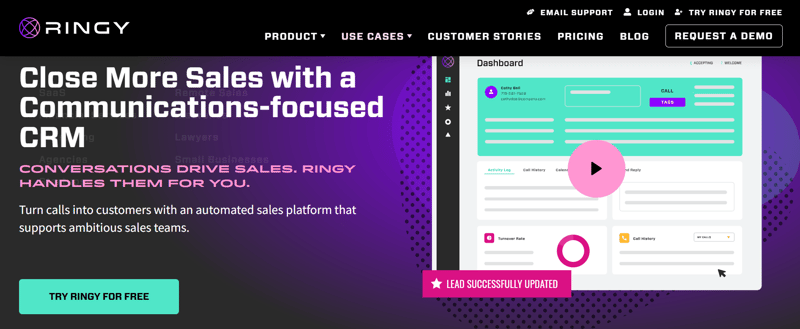
A Guide to Customizable CRM: Advantages, Features, Costs & Top 3 Solutions
 Updated on
Updated on
 By Bradley Kovacs
By Bradley Kovacs
Bradley Kovacs
Bradley has been passionate about technology since childhood, starting with Microsoft Flight Simulator at age six. In college, he automated his data e...
learn more
Bradley Kovacs
Bradley has been passionate about technology since childhood, starting with Microsoft Flight Simulator at age six. In college, he automated his data e...
Table of Contents
Table of Contents
Companies with distinctive sales operations depend on customizable CRM systems to provide their clients and users with an outstanding experience. Furthermore, robust CRM customization offers agents diverse reports, interfaces, and program options.
In this guide, we look at essential features for a customizable CRM build, the advantages of CRM customization, what the best custom CRM software is, how building custom CRM software can benefit an enterprise, and much more.
After this article, you'll understand all there is to know about implementing a customizable CRM system into your business.
What Is a Customized CRM?
A customized CRM is a specifically designed solution that meets the internal process criteria of an enterprise. The deployment of customizable CRM technology can help businesses manage their relationship with existing customers more effectively.
A customized CRM has the potential to automate company operations and harbor a loyal customer base. These two aspects alone are enough to cahoot any organization to utilize a customizable CRM.
When marketing and sales teams have robust tools, they can efficiently manage, analyze, and communicate with prospects. CRM systems can be customized to monitor client interactions from the following five sources:
- Emails
- Phone calls
- Social media
- Contact forms
- Search engines
Improving conversions and lead generation through a customized CRM's analytic capabilities is the number one reason why sales teams love using this technology.
Advantages of CRM Customization

Understanding how customizable CRM software can assist your business's growth is crucial to successful strategy implementation.
A customized CRM can be used as an indicator of cost reduction and return on investment or for significant tasks like boosting the company's public image.
Without minimizing the personalized, intimate character your business needs, a custom CRM enables sales and marketing process automation. Here we have listed the primary advantages a customized CRM offers organizations, so you can decide if it's worth incorporating one into your enterprise.
1. Improves Active Client Relationships
Your most valuable business asset isn't your product—it's your active customers. These are the people who consistently buy from you, trust your brand, and often advocate for it within their circles.
A customized CRM helps strengthen that loyalty by allowing you to better understand customer habits, preferences, and needs. With detailed insights, you can personalize communication, anticipate future behavior, and deliver experiences that keep customers engaged and coming back.
2. Connect Sales and Marketing Teams
Sales and marketing can only perform at their best when they're in sync. A customized CRM makes that possible by housing all customer data in one accessible place, updated in real time.
Marketing teams can segment audiences by demographics, interests, or purchase history, while sales teams can use those insights to prioritize leads and close deals faster. The result is smoother collaboration, smarter lead nurturing, and higher conversion rates.
3. Offers Sales Leaders More Control
When your sales leaders have clear visibility into team performance, productivity rises naturally. A customized CRM helps define hierarchies, assign roles, and automate routine management tasks, all tailored to your company's exact structure.
This gives sales directors more control over pipeline tracking, follow-ups, and performance monitoring, ensuring every rep stays accountable and aligned with overall business goals.
4. Data Stored in a Single Location
Keeping customer data organized and accessible is crucial to efficiency. A customized CRM solution provides a central hub for all client details, available to everyone on the team.
Systems like Ringy, for example, make it easy for sales reps to update client interactions in real time, ensuring every department works from the same accurate information. That means fewer mistakes, faster responses, and stronger collaboration across teams.
5. Puts Sales Processes and Customers First
At its core, CRM customization is about prioritizing your customers and the processes that serve them. Automation is the driving force here—it eliminates repetitive tasks, giving your sales team more time to strategize and build relationships.
By analyzing customer behavior patterns, a customized CRM allows businesses to anticipate problems before they happen, resulting in faster issue resolution and happier clients. Better service equals better satisfaction, and that's what drives long-term success.
6. Performance Monitoring
A customized CRM isn't just a database—it's a performance engine. With centralized data and real-time reporting, business leaders can monitor key metrics and make informed decisions faster.
Having instant access to performance data helps you identify trends, uncover opportunities, and fix issues before they escalate. It's a powerful way to stay proactive, agile, and fully in control of your company's direction.
Important Features to Look for in a Custom CRM

Okay, so what makes a customizable CRM actually good? It's not about having the most features; it's about having the right features that you can bend to your will.
When you're vetting custom CRM software or even planning a new CRM build, these are the non-negotiables.
1. Lead and Contact Management Tailored to Your Workflows
Every business manages leads differently. A custom CRM should adapt to your unique workflow, not the other way around. You should be able to define your own lead stages, categorize contacts based on activity, and assign ownership automatically.
According to Salesforce, businesses that use CRM tools effectively can increase sales by up to 29% and improve forecast accuracy by 42%. Custom lead management ensures you never miss an opportunity because your system mirrors your actual sales process.
Below is a table displaying various scenarios and how the customizable CRM streamlines the process.
|
Custom Event or Trigger |
CRM Automation Process |
|
Prospects fill out contact forms on a company website. |
The correct department or sales employees are sent the message directly. |
|
A sales representative receives a message |
Automated preset responses are sent to acknowledge the message. |
|
Unresponsive prospects, leads, or customers |
Follow-up emails are sent after a predetermined period, such as 24 to 48 hours |
|
Sales employees send messages or calls contacts |
Tracks communications and logs hours automatically |
|
When a sales rep completes a duty |
Upper management and supervisors are informed automatically |
Being number one on the importance scale means you should choose a customized CRM that offers workflow automation.
2. Calling, Texting, and Email Automation
Let's talk about saving time. Sales reps reportedly spend less than 30% of their time actively selling, with the rest eaten by admin tasks. A system that integrates communication directly is a game-changer. Look for the ability to:
- Click-to-call or send a text right from a contact record.
- Automate email and text follow-up sequences based on a lead's status.
- Log every interaction automatically, giving you a complete history without the manual data entry.
3. Sales Pipeline and Opportunity Tracking With Flexible Stages
Your sales process is unique, so your CRM should be too. Look for custom CRM software that lets you define your own pipeline stages, assign probabilities, and automate follow-ups at each stage.
Flexible opportunity tracking ensures your sales team always knows what's next. Plus, with real-time visibility, sales managers can spot bottlenecks early and make data-backed decisions that move deals forward faster.
4. Custom Reporting Dashboards and Kpis
How do you know if it's all working? Generic reports are noise. A customizable CRM lets you build dashboards that track the Key Performance Indicators (KPIs) that actually matter to your business.
For instance, tracking conversion rates, deal velocity, and campaign ROI from one dashboard eliminates guesswork. With clear visualizations, your team can quickly identify what's working and where improvements are needed.
5. API Integrations With Your Existing Tools
A powerful custom CRM build doesn't live in isolation—it integrates with your existing stack. Application Programming Interface (APIs) allow your CRM to connect seamlessly with accounting systems, marketing automation tools, or customer support platforms.
With the average sales team juggling 10 or more tools, a robust API is essential. This is the "connector" that allows your custom CRM software to "talk" to your other critical platforms—like your marketing automation tool, accounting software, or customer support desk. This "hub" approach prevents data silos and makes your CRM the true single source of truth.
Custom CRM Software Development vs. CRM Customization
This is the big question: do you build from scratch or tailor an existing tool? Let's break down the "build vs. buy" debate, because the right answer depends entirely on your resources, timeline, and how unique your needs really are.
Building Custom CRM Software vs. Configuring Existing Tools
Building custom CRM software means hiring developers to create an application from the ground up, just for you. Customizable CRM means taking a powerful, pre-built platform and molding it to fit your process.
Here's the head-to-head comparison:
|
Approach |
Pros |
Cons |
|
Building Custom CRM Software |
|
|
|
Configuring Existing Tools |
|
|
Hybrid Approach
The sweet spot for many businesses lies in the middle, a hybrid CRM customization strategy. This involves starting with a flexible, off-the-shelf solution (like Ringy, for example) and tailoring it through custom workflows, automation scripts, and third-party integrations.
This approach keeps costs manageable while allowing deep personalization. You get the reliability of an existing system plus the freedom to add features that make sense for your business.
How to Customize CRM Software Successfully
Customization is only effective when it's done strategically. A well-structured approach ensures your customizable CRM truly supports your goals instead of becoming an expensive tech project that no one uses.
Identify Goals and Bottlenecks
Start by defining what you want your customized CRM to achieve. Are you trying to shorten sales cycles, improve follow-ups, or automate data entry? Analyze your pain points and map them to measurable outcomes, such as increasing lead conversion by 20% or cutting manual admin time by half.
Map Workflows
Outline how your team interacts with leads, customers, and data. Mapping workflows helps identify inefficiencies that your custom CRM software can fix. Visualize each process step, like lead capture, qualification, and nurturing, so developers or administrators know exactly what to automate or redesign.
Choose the Right Base Software or Framework
If you're not building from scratch, choose a customizable CRM platform that's flexible enough to grow with you. Platforms like Ringy, HubSpot, or Zoho CRM offer open APIs and modular features that make configuration simple without heavy coding. Look for scalability, integration support, and ease of use.
Develop/Configure Features
Once your foundation is ready, start tailoring features. Examples include:
- Creating custom lead stages and tags.
- Automating follow-ups via email or SMS.
- Building dashboards for performance tracking.
- Integrating your CRM with marketing or accounting tools.
Effective CRM customization transforms manual processes into automated workflows that reduce errors and boost efficiency.
Train Users and Iterate
Even the most advanced custom CRM won't deliver results if users aren't comfortable using it. Provide role-based training, encourage feedback, and monitor adoption rates.
More importantly, listen to your team's feedback. They will immediately find small (or large) issues you missed. A customized CRM is never truly "finished"; it should evolve as your business does.
Common Problems With Implementation and How to Avoid Them
Here are some of the problems that come with trying to implement a customizable CRM and how to avoid them:
- Over-Customization: Adding too many features can confuse users. Focus on what drives results.
- Poor Data Migration: Ensure clean, accurate data before moving to your new system.
- Lack of User Buy-In: Involve end-users early in the process to increase adoption.
- Neglecting Maintenance: Regularly update your CRM and review workflows as your business evolves.
A well-planned custom CRM build or tailored configuration can completely transform how your business manages relationships, streamlines processes, and tracks growth. The key is to start simple, stay flexible, and keep refining as your team and goals evolve.
Best Custom CRM Software for Your Business
Finding the best custom CRM solutions for your business doesn't have to be as tricky as it sounds. Here we list the top customized CRM systems to help get the most out of your organization.
1. Ringy

Ringy is a CRM platform that offers unique, customizable options for its users. The solution is built for efficient customer communication and can be used to track, manage, or maintain sales pipelines.
The mobile accessibility of Ringy helps business owners and sales agents stay in contact with prospects no matter where they are. Users can also automate manual tasks, utilize progressive dialing, centralize reports, manage calendars, and perform communications to stretch their marketing budget further.
Moreover, Ringy allows business owners to test its platform through its free demo service.
2. HubSpot

This platform has comprehensive free edition CRM options comparable to higher-end products on the market. However, including additional features in the package requires that you spend extra money.
HubSpot is an excellent CRM ideal for people just beginning to dabble in customer relationship management. You can automate workflow, send emails, adjust your website, and create landing pages through this intuitive platform.
With its clean user interface and incredibly supportive customer service department, HubSpot is a firm favorite among enterprise owners.
3. Zoho CRM

Zoho is a great CRM for small businesses, with its feature plans catering to up to three agents. The software allows you to track deals, accounts, leads, and contacts through its innovative user dashboard.
Even though it is simple, the platform includes advanced accountability and inventory management features. A helpful customer support division is also ready to handle user troubleshooting queries.
Overall, Zoho CRM can assist companies in achieving their goals through its commitment to helping an organization spend its money more fruitfully.
Conclusion

Having the ability to customize a CRM to your business requirements is essential in this digital world. Certain companies need integrations, processes, or tools for them to function at an optimal level.
A customized CRM system can offer you that solution. Platforms like Ringy are built to give users the instruments they need to complete work tasks faster. But remember, custom CRM providers are only concerned about a business's productivity and financial health.
Utilizing a customized CRM application can boost earnings, locate revenue leaks, and maintain higher customer satisfaction. Why don't you sign up for a demo with Ringy to see how this custom CRM solution turns your organization into a powerhouse?

Skyrocket your sales with the CRM that does it all.
Calling? Check. SMS? Check. Automation and AI? Check. Effortlessly keep in touch with your customers and boost your revenue without limits.

Take your sales to new heights with Ringy.
Sales in a slump? Ringy gives you the tools and flexibility you need to capture leads, engage with them, and turn them into customers.
Subscribe to Our Blog
Enter your email to get the latest updates sent straight to your inbox!
Categories
Related Articles





































































































